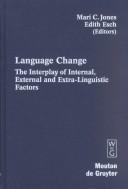| Listing 1 - 10 of 17 | << page >> |
Sort by
|
Book
ISBN: 9789042921139 9042921137 Year: 2008 Volume: 31 Publisher: Leuven Peeters
Abstract | Keywords | Export | Availability | Bookmark
 Loading...
Loading...Choose an application
- Reference Manager
- EndNote
- RefWorks (Direct export to RefWorks)
Theory of literary translation --- Translation science --- Normand (dialecte) --- Anglais (langue) --- Français (langue) --- Anglo-Norman dialect --- Translating and interpreting --- Traductions françaises --- Variation linguistique --- Influence sur l'anglais --- Martin, Thomas, --- Guernesey (GB) --- Langues --- Academic collection --- 447 --- Language French language variations --- Interpretation and translation --- Interpreting and translating --- Language and languages --- Literature --- Translation and interpretation --- Translators --- Anglo-French dialect --- Anglo-Norman French dialect --- Law French --- Norman-French dialect --- French language --- Translating --- Martin, Thomas --- Guernsey (Channel Islands) --- Traductions françaises. --- Variation linguistique. --- Influence sur l'anglais. --- Langues. --- Français (langue) --- Traductions françaises.
Book
ISBN: 9004257136 9789004257139 9004257128 9789004257122 9789004257122 1322630445 Year: 2015 Publisher: Leiden, The Netherlands
Abstract | Keywords | Export | Availability | Bookmark
 Loading...
Loading...Choose an application
- Reference Manager
- EndNote
- RefWorks (Direct export to RefWorks)
King John of England’s defeat by the French in 1204 led to the territorial fragmentation of the Duchy of Normandy. Henceforth, the Norman mainland, allied to France, and the Channel Islands, allied to England, would find themselves on different sides of an ever-widening linguistic gulf. In Variation and Change in Mainland and Insular Norman , Mari C. Jones examines the way in which contact between the Norman dialect and its two typologically different superstrates (French and English) provides optimal conditions to study the linguistic mechanisms of ‘dialect contact’ and ‘language contact’. Through the analysis of extensive and original phonological, morphosyntactic and lexical data, set in their historical and sociolinguistic contexts, this fascinating study explores how advergence with its superstrates has led Norman to diverge linguistically within these territories.
French language --- Anglo-Norman dialect --- Anglo-French dialect --- Anglo-Norman French dialect --- Law French --- Norman-French dialect --- Langue d'oïl --- Romance languages --- Variation. --- Dialects --- Channel Islands --- Normandy --- Languages.
Book
ISBN: 9781107279063 9781107049598 9781107627840 9781316129081 131612908X 1107279062 9781316130179 1316130177 9781316131268 1316131262 1107049598 1107627842 1316120368 1316121453 1316132358 1316127990 1322521654 9781316120361 9781316121450 9781316132357 9781316127995 Year: 2015 Publisher: Cambridge
Abstract | Keywords | Export | Availability | Bookmark
 Loading...
Loading...Choose an application
- Reference Manager
- EndNote
- RefWorks (Direct export to RefWorks)
At a time when many of the world's languages are at risk of extinction, the imperative to document, analyse and teach them before time runs out is very great. At this critical time new technologies such as visual and aural archiving, digitisation of textual resources, electronic mapping and social media, have the potential to play an integral role in language maintenance and revitalisation. Drawing on studies of endangered languages from around the world - Europe, Asia, Africa and North and South America - this volume considers how these new resources might best be applied, and the problems that they can bring. It also re-assesses more traditional techniques of documentation in light of new technologies and works towards achieving a practicable synthesis of old and new methodologies. This accessible volume will be of interest to researchers in language endangerment, language typology and linguistic anthropology, and to community members working in native language maintenance.
Language obsolescence --- Language and languages --- Foreign languages --- Languages --- Anthropology --- Communication --- Ethnology --- Information theory --- Meaning (Psychology) --- Philology --- Linguistics --- Language death --- Obsolescence of languages --- Historical linguistics --- Sociolinguistics --- Endangered languages --- Extinct languages --- Technological innovations. --- Obsolescence
Book
ISBN: 1316355411 1316361810 1316363813 1316362817 1316358410 131636481X 1316162885 1107099226 1107491983 1316349411 Year: 2015 Publisher: Cambridge : Cambridge University Press,
Abstract | Keywords | Export | Availability | Bookmark
 Loading...
Loading...Choose an application
- Reference Manager
- EndNote
- RefWorks (Direct export to RefWorks)
Language policy issues are imbued with a powerful symbolism that is often linked to questions of identity, with the suppression or failure to recognise and support a given endangered variety representing a refusal to grant a 'voice' to the corresponding ethno-cultural community. This wide-ranging volume, which explores linguistic scenarios from across five continents, seeks to ignite the debate as to how and whether the interface between people, politics and language can affect the fortunes of endangered varieties. With chapters written by academics working in the field of language endangerment and members of indigenous communities on the frontline of language support and maintenance, Policy and Planning for Endangered Languages is essential reading for researchers and students of language death, sociolinguistics and applied linguistics, as well as community members involved in native language maintenance.
Endangered languages. --- Language obsolescence. --- Language planning. --- Language policy. --- Language maintenance. --- Language and culture. --- Culture and language --- Culture --- Language and languages --- Language loyalty --- Maintenance of language --- Sociolinguistics --- Glottopolitics --- Institutional linguistics --- Language and state --- Languages, National --- Languages, Official --- National languages --- Official languages --- State and language --- Communication policy --- Language planning --- Planned language change --- Language death --- Obsolescence of languages --- Historical linguistics --- Endangered languages --- Extinct languages --- At-risk languages --- Disappearing languages --- Dying languages --- Fading languages --- Nearly extinct languages --- Threatened languages --- Vanishing languages --- Language obsolescence --- Maintenance --- Government policy --- Planning --- Obsolescence --- Sociolinguistics.
Digital
ISBN: 9781107279063 Year: 2015 Publisher: Cambridge Cambridge University Press
Abstract | Keywords | Export | Availability | Bookmark
 Loading...
Loading...Choose an application
- Reference Manager
- EndNote
- RefWorks (Direct export to RefWorks)
Multi
ISBN: 9781316162880 9781107099227 9781107491984 Year: 2015 Publisher: Cambridge Cambridge University Press
Abstract | Keywords | Export | Availability | Bookmark
 Loading...
Loading...Choose an application
- Reference Manager
- EndNote
- RefWorks (Direct export to RefWorks)

ISBN: 0415317754 0415317746 Year: 2005 Publisher: London Routledge
Abstract | Keywords | Export | Availability | Bookmark
 Loading...
Loading...Choose an application
- Reference Manager
- EndNote
- RefWorks (Direct export to RefWorks)
Lexicology. Semantics --- Comparative linguistics --- Sociolinguistics --- Language change. --- Language obsolescence. --- Language planning. --- Language revival. --- Language change --- Language obsolescence --- Language planning --- Language revival --- Language and languages --- Language renewal --- Language revitalization --- Renewal, Language --- Restoration of languages --- Revitalization, Language --- Revival of languages --- Planned language change --- Language death --- Obsolescence of languages --- Historical linguistics --- Endangered languages --- Extinct languages --- Change, Linguistic --- Restoration --- Revival --- Planning --- Obsolescence
Book
ISBN: 9781107148352 9781316562949 9781316602584 1316602583 1107148359 1316876306 1316876217 1316876489 131687639X 1316876756 1316562948 1316863190 Year: 2017 Publisher: Cambridge Cambridge University Press
Abstract | Keywords | Export | Availability | Bookmark
 Loading...
Loading...Choose an application
- Reference Manager
- EndNote
- RefWorks (Direct export to RefWorks)
Creating an orthography is often seen as a key component of language revitalisation. Encoding an endangered variety can enhance its status and prestige. In speech communities that are fragmented dialectally or geographically, a common writing system may help create a sense of unified identity, or help keep a language alive by facilitating teaching and learning. Despite clear advantages, creating an orthography for an endangered language can also bring challenges, and this volume debates the following critical questions: whose task should this be - that of the linguist or the speech community? Should an orthography be maximally distanciated from that of the language of wider communication for ideological reasons, or should its main principles coincide for reasons of learnability? Which local variety should be selected as the basis of a common script? Is a multilectal script preferable to a standardised orthography? And can creating an orthography create problems for existing native speakers?
Endangered languages --- LANGUAGE ARTS & DISCIPLINES --- Language and languages --- Language revival --- Orthography and spelling. --- Linguistics --- Historical & Comparative. --- Social aspects. --- Orthography --- Spelling --- Writing --- Language renewal --- Language revitalization --- Renewal, Language --- Restoration of languages --- Revitalization, Language --- Revival of languages --- Sociolinguistics --- At-risk languages --- Disappearing languages --- Dying languages --- Fading languages --- Nearly extinct languages --- Threatened languages --- Vanishing languages --- Language obsolescence --- Spelling reform --- Restoration --- Revival

ISBN: 311017202X 3110892596 Year: 2002 Volume: 86 Publisher: Berlin Mouton de Gruyter
Abstract | Keywords | Export | Availability | Bookmark
 Loading...
Loading...Choose an application
- Reference Manager
- EndNote
- RefWorks (Direct export to RefWorks)
This volume focuses on the interface of different motivating factors that contribute to language change. It combines linguistic case studies with current theoretical debate and contains hitherto unpublished data from English, French, Karaim, Modern Greek, Jordanian, Spanish, Latin and Arabic.
Linguistic change --- Languages in contact --- Change, Linguistic --- Language change --- Historical linguistics --- Language and languages --- Areal linguistics --- Dialectology --- Sociolinguistics --- Linguistic change. --- Languages in contact.
Book
ISBN: 9781139245890 9781107029064 9781107689633 1107689635 1139245899 9781107598164 1107598168 1107029066 1107702747 9781107702745 1107701716 9781107701717 1107666740 9781107666740 1107703719 9781107703711 1139892215 1108790402 Year: 2013 Publisher: Cambridge, UK
Abstract | Keywords | Export | Availability | Bookmark
 Loading...
Loading...Choose an application
- Reference Manager
- EndNote
- RefWorks (Direct export to RefWorks)
Many of the world's languages have diminishing numbers of speakers and are in danger of falling silent. Around the globe, a large body of linguists are collaborating with members of indigenous communities to keep these languages alive. Mindful that their work will be used by future speech communities to learn, teach and revitalise their languages, scholars face new challenges in the way they gather materials and in the way they present their findings. This volume discusses current efforts to record, collect and archive endangered languages in traditional and new media that will support future language learners and speakers. Chapters are written by academics working in the field of language endangerment and also by indigenous people working 'at the coalface' of language support and maintenance. Keeping Languages Alive is a must-read for researchers in language documentation, language typology and linguistic anthropology.
Endangered languages. --- Language obsolescence. --- Language maintenance. --- Typology (Linguistics) --- Anthropological linguistics. --- Anthropo-linguistics --- Ethnolinguistics --- Language and ethnicity --- Linguistic anthropology --- Linguistics and anthropology --- Anthropology --- Language and culture --- Linguistics --- Grammar, Comparative and general --- Language and languages --- Linguistic typology --- Linguistic universals --- Language loyalty --- Maintenance of language --- Sociolinguistics --- Language death --- Obsolescence of languages --- Historical linguistics --- Endangered languages --- Extinct languages --- At-risk languages --- Disappearing languages --- Dying languages --- Fading languages --- Nearly extinct languages --- Threatened languages --- Vanishing languages --- Language obsolescence --- Typology --- Classification --- Maintenance --- Obsolescence --- Arts and Humanities --- Language & Linguistics
| Listing 1 - 10 of 17 | << page >> |
Sort by
|

 Search
Search Feedback
Feedback About UniCat
About UniCat  Help
Help News
News